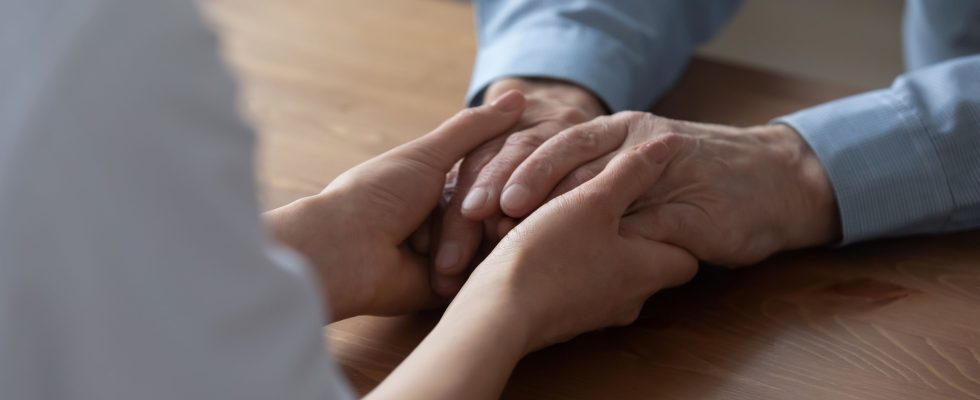Meeting Thibaud Caquot is no easy feat. One afternoon he swore to us that he couldn’t, before realizing that he had mixed up the days of the week. Even in front of his house, we had to wait for him to come down to type the code into the intercom himself. “I remember the reason, but I can’t tell you the numbers.” Tons of stupidities, impossible to predict. “You see, I definitely have Alzheimer’s,” he slips as he climbs his creaky staircase.
At home, no cane, emergency call button, or anti-fall handles, but two turntables and hundreds of vinyl records from the time when he mixed before David Guetta at the Le Palace club. In her kitchen living room, an arcade game machine, a pink fridge and her two youngest children, who reach her waist. Nothing, in short, of the paraphernalia that we usually give to those suffering from the disease, ill with the century of developed countries and their aging populations. Thibaud Caquot triggered Alzheimer’s even before losing his red hair. At 56, he has all his hair but no longer his whole head.
This sentence, his wife, Isabella, an overexcited Italian – “his heroine” – could have pronounced it. The couple adopted a cat and a lively sense of humor to protect themselves from the drama that befell them in 2019. Thibaud began to derail in front of Netflix. Finally, this is what he thinks he remembers: “I asked Isabella to go back, I no longer recorded what was happening”. At the time, the partner with whom he created a thriving audiovisual company became annoyed. How does Thibaud, once the “fastest video editor in Paris”, according to his wife, manage to forget so many appointments? It seems like he no longer enjoys his work.
Bringing back the genius
A long wandering followed. The entrepreneur was already working 70 hours a week, moving from cartoon Corneil and Bernie to the movie The guys, or to advertisements from major brands. He still tries to compensate for the strange weakness that suddenly imprisons him. A call cuts off the interview. A friend asks him the name of this hardware store he had told him about. Impossible to remember. “What do you mean, I have Alzheimer’s,” he quips again, before removing his rectangular glasses for a moment. He puts his face in his hands, as if rubbing it was enough for his genius to return. Here he is who recalls the sequence of events: “And then I burned out. It was hell. I had suicidal thoughts.”
Isabella sends him to the psychologist. Who sends him to the psychiatrist. Who sends him to the neurologist. He spends a day in Saint-Anne, lumbar puncture and scan option. “I told you that I had seen a neurologist too?”, worries Thibaud. The couple then decide to get married, after twenty years of living together. Because they love each other, and because you never know, it’s better to do it now, maybe in a few years it won’t be possible anymore. It is Isabella who narrates this passage; Thibaud no longer remembered it. She tests: “Do you remember the month?” Thibaud says July. It was in June. Tears are not far away.
Doctors rarely give such a diagnosis to such young patients. In France, only 33,000 people out of the million affected by this neurodegenerative condition are under 65 years old. So Thibaud Caquot decided to talk about it, to raise awareness. He is involved with the Foundation for Medical Research *. No effective medication is available in France to slow the clinical signs of the disease. The father wants to participate in clinical trials, but the doctors refuse, because of other health concerns. There are these new molecules developed in the United States, but they are controversial. Despite all this, Thibaud feels surprisingly relieved: “It was no longer my fault, all these oversights!” The night after the diagnosis, he sleeps soundly when Isabella paces.
Above all, no stress
Since then, the couple has been sailing by sight. Thibaud Caquot works a few hours a week. He attaches GPS trackers to all his belongings. “I sold my business. But stop me if I already told you that.” When he is not with the speech therapist, the psychomotor therapist or the occupational therapist, he draws, paints, makes music, reads. Keeping your brain awake limits the death of neurons. “A bit like doing lots of sudokus, it keeps you going,” summarizes Isabella. As soon as he is tired in the evening, he goes to bed, to avoid overworking himself. Above all, no stress, otherwise he will lose control. Isabella cleans it up, she who has always spoken loudly and has such hot blood.
When Thibaud announced his illness to his teenager, the second of his three children, she was offended: “Does that mean that I’m going to have it too?”, before really realizing it. Sometimes his dad sets the table on purpose, just for fun. But one morning, without realizing it, he emptied all the glasses of orange juice he had just filled. In the morning, it’s always more difficult. The mist stays in his head longer than in everyone else’s.
“But hey, at least since he’s disabled, we can park wherever we want, it’s not luxury in Paris,” jokes Isabella. Children are happy to be able to go to Disneyland for free. Thibaud talks about the “power” he now has over others: he can even make someone stand up in the metro and take their place. We laugh, so as not to live a gray life.
*Recognized as being of public utility, the Foundation for Medical Research, which has made Alzheimer’s disease a priority research area, is organizing its sixth national mobilization campaign from September 16 to 21, 2023, which will fund promising research projects. French people can make a donation until the end of September to support the fight against Alzheimer’s disease on frm.org.
